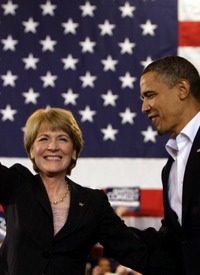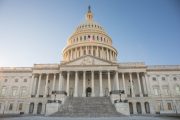
Despite President Obama’s quick flight to Boston on Sunday to try to rescue Martha Coakley’s faltering bid for the Senate seat vacated last summer, polls and others think his efforts just may be too late.
Speaking at Boston’s Northeastern University, Obama said: "Understand what’s at stake here, Massachusetts. Where we don’t want to go is backwards. I need leaders like Martha by my side so we can kick [passage of healthcare] into high gear, so we can finish what we’ve started."
Thousands of phone calls to voters were being orchestrated by Organizing for America, an outgrowth of Obama’s army of volunteers. Jeremy Bird, Deputy Director, said that 90,000 phone calls were made on Saturday, and another 90,000 were scheduled for Sunday. Scores of others in the Obama administration took three days off to work for the Coakley campaign as well. In addition many hundreds of thousands of dollars were being pumped into the Coakley campaign. “It is not unusual to see three or four [campaign advertisements] in a row during local newscasts,” according to the New York Times.
Pollsters are calling the race very close or even a victory for Republican Scott Brown. Even though Democrats outnumber Republicans three-to-one, independents outnumber them both. And independents, like Angela Grenham, raised a Massachusetts Democrat, now supports State Senator Scott Brown. This weekend she stood on a street corner in Marlborough, a suburb of Boston, holding up a sign supporting Brown. Drivers honked their approval while supporters of Coakley on another corner gave up and left. She said, “The response was not great for them.”
According to the Suffolk poll, Brown was holding a 30-point advantage among independents.
Some were skeptical that Obama’s sudden appearance would make any difference in the Coakley campaign. According to David Paleologos, director of the Political Research Center in Boston’s Suffolk University, Obama’s visit was “less about persuasion — just one percent of voters are still undecided — and more about inspiration.” (Emphasis added.)
Tom Jensen, director of Public Policy Polling, said that when President Obama attended political rallies in New Jersey and Virginia last year, “the polls actually got worse for the Democratic candidates there after Obama came.”
Despite his liberal voting record while a member of the State Senate, Brown has built his campaign around his promise to vote against Obamacare if he is elected. His win would leave the Democrats one vote shy of the 60 votes needed to stop a filibuster.
As the likelihood of a Brown victory grew, panicky Democrats began crafting other options to get the healthcare measure passed without his vote. According to the Associated Press, the most likely scenario would require persuading Democrats in the House to accept the Senate bill without any changes.
[That] plan is highly problematic. House liberals already are bristling over changes the Senate forced upon them earlier, and some may conclude that no bill is better than the Senate bill. Meanwhile, some moderate Democrats may abandon the health bill altogether after seeing a Republican win Kennedy’s seat in strongly Democratic Massachusetts.
Another option being considered is to act on a bill before Brown is sworn in. Massachusetts allows 10 days before declaring a victor, and that might be enough time to iron out the differences between the two bills
A third option is finding a Republican to cast a vote for the bill, thus cancelling out Brown’s promised vote against it. Some Democrats are hoping Senator Olympia Snow (R-Maine) might cross over.
A final option is to “start over and pass a new, scaled back health bill using budget reconciliation, which requires [only] a simple majority of 51 Senate votes.”
None of these options is particularly attractive, according to the Times: "But there is little appeal in those choices. Rushing a bill through the Senate would prompt howls from Republicans and accusations of foul play. And budget reconciliation would most likely require scaling back the scope of the health care changes."
Regardless of how the election turns out on Tuesday, Democrats will likely pay a heavy price. Republican Senate leader, Mitch McConnell (R-Ky.) said, “I think the politics are toxic for the Democrats either way.”
Photo Martha Coakley and Barack Obama: AP Images

